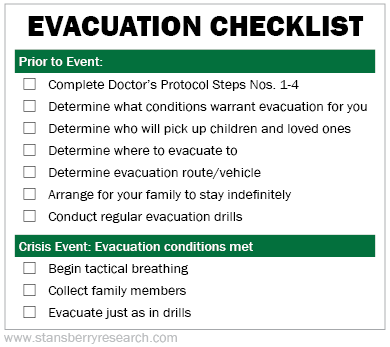Your favorite retirement state is disaster-prone.
Florida ranks as the fifth most natural disaster-prone state in the U.S. It comes in after California, Texas, Oklahoma, and Washington.
And it might surprise you that it's not just hurricanes doing the damage. Florida sees wildfires along the panhandle every year that destroy thousands of acres of land. That includes homes.
Over the past few weeks, we've written about different ways to prepare for disasters. As September is National Preparedness Month through the Federal Emergency Management Agency (FEMA), we wanted to focus on different ways to prepare yourself before disaster strikes.
There's one point I want to drive home – no matter where you live or what disaster you may face, you can't rely on anyone to come save you. Not your family, not your neighbors, not even FEMA.
It's unfortunate, but government responses are unlikely to save you in a crisis. Two days before the 2005 Hurricane Katrina disaster, the mayor of New Orleans delayed the evacuation order. He decided to consult with his lawyers to make sure the city would not get sued by businesses.
Governments also distrust the citizenry finding out the honest facts about the severity of a crisis. They believe it will lead to mass chaos. By patronizing their citizens in this way, they consign many to death.
Do not wait for "official" orders or decrees. Follow your own disaster preparedness plan.
As we marked the anniversary of 9/11 last week, I remembered the story of Rick Rescorla, who was the head of corporate security for Morgan Stanley. After the planes hit the twin towers, the Port Authority told everyone to remain inside the towers. But Rick Rescorla instantly implemented an evacuation plan. And his actions saved thousands of lives.
When it comes to your own disaster response, do what Rick Rescorla did. Take action according to your predesigned and practiced plan.
It will save your life.
One of the best ways to do this – make a plan and practice it.
Book knowledge is useful... but you can never replace practical experience. You MUST practice your emergency plans on a regular basis. I prefer to keep mine current on at least a quarterly basis.
The good news is this practice doesn't have to be time consuming. There is a great "cheat sheet" approach to emergency preparedness. It's called using checklists.
For example, the military uses written standard operating procedures for every activity it conducts. Checklists are integral to ensuring success. They're an easy way to make sure personnel follow the correct procedures every time. Ask any pilot, and he'll tell you... he won't even think about flying an airplane before completing his pre-flight checklist.
You can create checklists based on what I cover in my book, The Doctor's Protocol. In it, I detail steps of how to handle various crises.
After reading my book, you can create checklists that codify your response plans. They should be right to the point. Cut out all extraneous data. You don't need explanations in checklists. You just need the appropriate steps to take, listed in the proper order.
Remember, checklists can be physical or mental. Set up physical checklists on paper for your most likely disaster situations. But also make a mental checklist every time you enter a new potential crisis environment.
For example, going to a movie theater and noting where the exits are located is part of forming a mental checklist. Ask yourself, if a disaster like a fire were to break out, what would I do? What would be my primary escape route? What would be my backup route? How would I shepherd my family away?
It's a simple mental exercise of no more than 30 seconds, and it can make all the difference in your survival. If a crisis happens, you will be confident and ready to act immediately... ready to carry out your mental checklist.
Here's a sample checklist for preparing for an evacuation.

If you want to learn even more about disaster preparedness, I urge you to read The Doctor's Protocol. Current Retirement Millionaire subscribers can access it right here. If you don't have a subscription, click here to get started and access the book today.
What We're Reading...
- The number of disasters is on the rise.
- Something different: Paging Captain Nemo.
Here's to our health, wealth, and a great retirement,
Dr. David Eifrig and the Health & Wealth Bulletin Research Team
September 19, 2019
